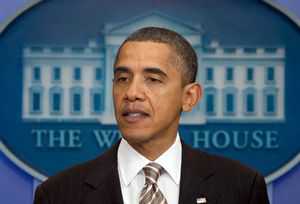|
Wednesday, December 9, 2009—Volume 6, Issue 226 THE JAMESTOWN FOUNDATION
|
|
by Vladimir Socor Turkish Prime Minister Recep Tayyip Erdogan has clearly reaffirmed the linkage between normalization of Turkey-Armenia relations and early substantial progress toward resolution of the Armenia-Azerbaijan conflict. Ankara defines such progress as an agreement on withdrawal of Armenian troops from occupied districts of Azerbaijan beyond Upper Karabakh, pending a determination of the latter’s future status. Erdogan reinforced this linkage during his December 7-8 visit to Washington, despite U.S. and E.U. attempts in recent months to break that linkage and to convince Ankara also to break it. That course of action ignored and alienated Azerbaijan, playing into Russia’s hands and jeopardizing Western strategic interests in the South Caucasus. Washington and Brussels seemed to be guided primarily by internal political considerations in adopting that policy. They will now have to reconsider it, in the wake of Erdogan’s and Foreign Minister Ahmet Davutoglu’s latest clarifying statements. The U.S. agenda for Erdogan’s visit, as publicized ahead of the event (White House website, December 4) included neither the Karabakh conflict nor energy projects such as Nabucco among the issues to be discussed by President Barack Obama with Erdogan. The first omission reflected Washington’s attempts to de-link the Karabakh conflict-resolution negotiations from Turkey-Armenia normalization. U.S. policy (seconded by that of the E.U. and Russia) pressed for Turkish parliamentary ratification of the October 10 Turkey-Armenia protocols on establishing full diplomatic relations and opening the land border between them, without conditioning this on Armenian troop withdrawal from certain Azerbaijani districts. The omission of energy transit issues from the U.S.-prepared agenda remained without official explanation, but could be seen as relegating Caspian and European energy security to a secondary level on the White House’s list of priorities. This perception would ipso facto reduce Azerbaijan’s importance to U.S. policy in this administration, compared with preceding U.S. administrations of both parties. Obama solicited Turkish support on Afghanistan, Iran, and Iraq as top U.S. priorities, while also urging Turkish ratification of the protocols with Armenia. Obama did not mention the Armenia-Azerbaijan conflict or a Karabakh resolution process at the concluding news conference. It was Erdogan who reintroduced this issue into the equation: “We have also discussed [issues] between Azerbaijan and Armenia, which are of great importance in the context of Turkey-Armenia relations…because the normalization process between Turkey and Armenia is very much related to those issues,” Erdogan stated at the joint news conference (White House press release, December 7; APA, PBS, December 8). In follow-up statements in Washington, Erdogan recounted that he had “explained to him [Obama]” that Turkey-Armenia normalization is difficult without resolving the Armenia-Azerbaijan conflict. The Turkish parliament is “conditioning” the protocols’ ratification on conflict-resolution, it “feels strongly about this,” and it “cannot be dictated to,” he declared. He called for Armenian troop withdrawal from seven Azerbaijani districts and urged the “Minsk Group’s” co-chairs (U.S., Russia, France) to promote that goal (APA, December 8). U.S. policy makers were still pressing as recently as last month for de-synchronizing the two processes. On the eve of Erdogan’s visit, however, the Turkish position had become clear. During the OSCE’s year-end conference in Athens, Davutoglu stated that the Turkish parliament can only ratify the Turkey-Armenia protocols after the Karabakh issue is resolved (Trend, December 2). Erdogan clarified—in an interview televised in Azerbaijan––that “resolution” means, in this context, “reaching an agreement [between Azerbaijan and Armenia] regarding the seven districts….We have told U.S. officials all along: If you want to resolve the Turkey-Armenia issue, you should also resolve the Karabakh conflict. Otherwise any resolution would be impossible…The Turkish-Armenian issue and the Karabakh problems are closely related” (ANS TV cited by Day.az, December 4, 5). The Turkish parliament’s foreign policy commission chairman, Suat Kiniklioglu, corroborated this view in a public debate in Brussels. While Turkey-Armenia normalization has the potential to dramatically improve the overall situation in the South Caucasus, “it would be incomprehensible and illogical to normalize relations on one side while maintaining a conflict on the other side” (Day.az, December 4). Ankara was slow to clarify its position in recent months. For its part, Washington put domestic politics ahead of strategic considerations. To deflect pressures from Armenian advocacy groups and a large part of the U.S. Congress, the Obama administration decided to push for re-opening the Turkish-Armenian border before April 2010, when the Armenian genocide resolution comes up for reconsideration in Congress. Candidate Obama had promised to sign such a resolution, but President Obama cannot do so. Instead, the White House decided in April 2009 (at the time of Obama’s visit to Turkey) to press for re-opening the Turkish-Armenian land border, hoping to defuse the explosive potential from the annual political debate on the genocide issue. This course of action, however, could only be pursued at Azerbaijan’s expense and at the risk of fracturing the Turkey-Azerbaijan partnership, instead of nurturing it. That partnership largely accounts for the West’s strategic gains in the South Caucasus-Caspian region over the past decade. Strained recently by Russian advances in the region and a burgeoning Russo-Turkish partnership, the West’s gains could be severely jeopardized by policies that isolate Azerbaijan or sacrifice its interests. Baku does recognize—as presidential adviser Novruz Mammadov has put it (www.day.az, December 6)—that the U.S. initiative to help normalize Turkey-Armenia relations can generate positive dynamics for regional cooperation, if this initiative is synchronized with Karabakh conflict-resolution. But it would only exacerbate tensions in the region, if the two processes are separated, instead of converging. –Vladimir Socor |






 U.S. — President Barack Obama (R) meets with Turkish Prime Minister Recep Tayyip Erdogan in Washington, DC, 07Dec2009
U.S. — President Barack Obama (R) meets with Turkish Prime Minister Recep Tayyip Erdogan in Washington, DC, 07Dec2009
